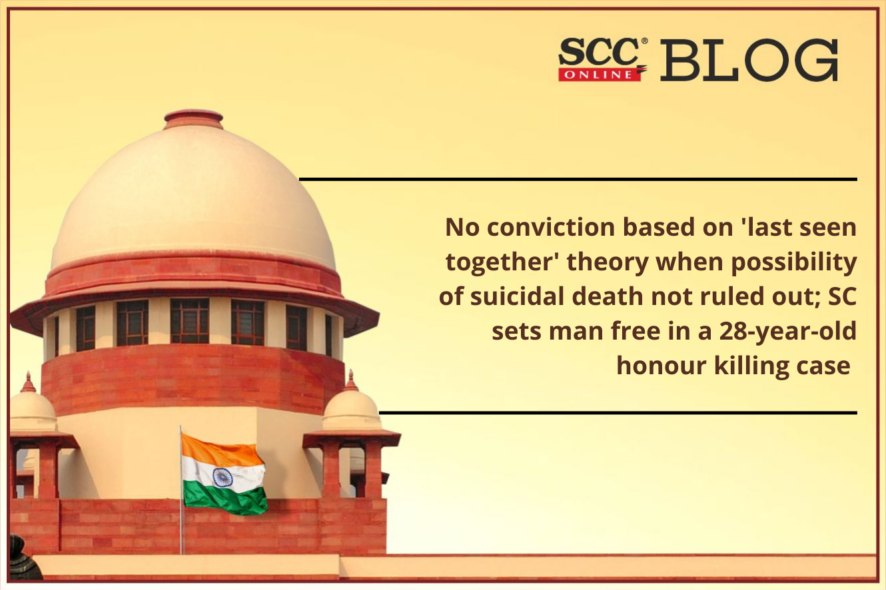Supreme Court: Explaining the law on “last seen together”, the bench of Dr. DY Chandrachud and Bela M. Trivedi*, JJ has held that in order to convict an accused under Section 302 IPC the first and foremost aspect to be proved by prosecution is the factum of homicidal death. If the evidence of prosecution falls short of proof of homicidal death of the deceased, and if the possibility of suicidal death could not be ruled out, the accused cannot be convicted merely on the basis of the theory of “Last seen together”.
“The suspicion howsoever strong cannot take place of proof.”
The Court was deciding the case where a young couple belonging to different castes were found hanging from a tree after having gone missing for days. The love affair of Brinda and Kanhaiya did not sit well with Brinda’s father and uncle. While Brinda and Kanhaiya went missing on 02.12.1994, no missing report was lodged. Their decomposed bodies were found hanging from a cashew tree in a cashew nursery on 11.12.1994. It was alleged that Brinda’s uncle had killed both of them and had kept the bodies in the house upto 04.12.1994, after which he had taken the bodies to the cashew nursery and had hung them on a cashew tree to give it the shape of them having committed suicide.
A witness had allegedly last seen Kanhaiya with the accused 10 days prior to the date on which the bodies were found. The witness had stated that the accused had called Kanhaiya and took him to his house where he, along with four co-accused, allegedly in furtherance of common intention pressed his neck and committed his murder. Thereafter, the two co-accused committed the murder of Brinda. One of the co-accused Videshi had also made an extra-judicial confession pointing towards the guilt of the accused.
It was argued by the counsel of the accused that the testimony of the witness who had allegedly last seen Kanhaiya, having been called by the accused, was recorded after 4 months of the incident. Even as per the case of the prosecution, the said incident of calling Kanhaiya by the appellant was 10 days prior to the date on which the dead bodies were found in the Cashew Nursery, and there being long time gap between the day the deceased was allegedly last seen with the appellant and the day when his dead body was found, it was very risky to convict the accused solely on such evidence. He further submitted that the doctor who had performed the postmortem had also opined that the cause of death was asphyxia as a result of hanging and the nature was suicidal. Thus, in absence of any clear or cogent evidence against the appellant, both the courts had committed gross error in convicting the appellant.
The Court took note of the following rulings on the ‘last seen together’ theory:
Bodhraj v. State of Jammu and Kashmir, (2002) 8 SCC 45: The last-seen theory comes into play where the time-gap between the point of time when the accused and the deceased were last seen alive and when the deceased is found dead is so small that possibility of any person other than the accused being the author of the crime becomes impossible.
Arjun Marik v. State of Bihar, 1994 Supp (2) SCC 372: The only circumstance of last seen will not complete the chain of circumstances to record the finding that it is consistent only with the hypothesis of the guilt of the accused, and therefore no conviction on that basis alone can be founded.
Hence, having regard to the totality of evidence on record, the Court held that the High Court had committed gross error in convicting the accused for the alleged charge of 302 read with 34 of IPC, relying upon a very weak kind of evidence of extra judicial confession allegedly made by the co-accused Videshi, and the theory of “Last seen together” propounded by the prime witness.
The Court observed that no evidence worth the name as to how and by whom the deceased Brinda was allegedly murdered was produced by the prosecution. Under the circumstances, it was held that the prosecution had miserably failed to bring home the charges levelled against the accused beyond reasonable doubt. The Court, hence, acquitted the accused of all the charges levelled against him.
[Chandrapal v. State of Chhattisgarh, 2022 SCC OnLine SC 705, decided on 27.05.2022]
*Judgment by: Justice Bela M. Trivedi
Counsels
For appellant-accused: AOR Akshat Shrivastava, Adv Pooja Shrivastava,
For Respondent(s): Dy AG Sourav Roy, Advocates Mahesh Kumar, Kaushal Sharma, Devika Khanna, V D Khanna, VMZ Chambers






